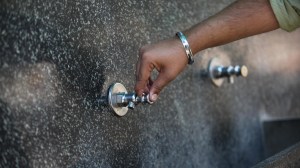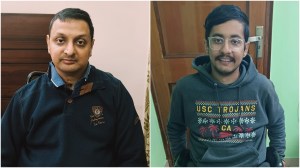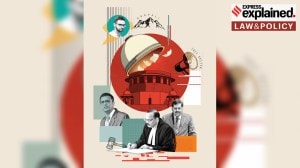Back to business
By the time we pulled into Wagah, it was almost seven hours since we had left but Khaleequr Rehman Khan had travelled a little ahead in time...

By the time we pulled into Wagah, it was almost seven hours since we had left but Khaleequr Rehman Khan had travelled a little ahead in time: he was already dreaming of Karachi, of spending the weekend with wife Nuzhat, a Pakistan national, and playing with his kids. Of unpacking his suitcase.
So when he learnt8212;from a source not quite reliable8212;that his cousin Umar may not be there to receive him in Lahore, Khan didn8217;t let that put him off. 8216;8216;I will still board the flight to Karachi.8217;8217;
But four hours later, as he waded through the evening crowd at Falettis Hotel in Lahore, Khan spotted Umar. 8216;8216;I told you he would show up,8217;8217; he shouted, embracing his cousin.
As for Umar, it was like old times: 8216;8216;I8217;m sure he told you that I was a dur ka cousin and probably won8217;t come to fetch him. Sarhad ne hamein door kar diya, par rishtedar to ham phir bhi huey The border made us distant, but we are still cousins.8217;8217;
Lahore roared as the bus from Delhi rolled in but there were countless on both sides, not on board, who kept cheering: a positive straw in the positive wind.
You could see the hope, excitement in Khan8217;s eyes long before he boarded the bus in Delhi this morning. He posed for cameras each time he was told, among the last to board the Sada-e-Sarhad. Even the rain-drenched morning couldn8217;t dampen his spirits. So much so that he took a swipe at all of us: 8216;8216;I suddenly feel very important. I8217;m no ordinary passenger, but a messenger of peace. Nobody took me seriously when I spoke at home on Indo-Pak relations but today all of you want to air my views. I must make full use of this.8217;8217;
Like most young men, he grew up cheering for the Indian cricket team, he said. He still remembers that dreadful day when Javed Miandad hit a last-ball six off Chetan Sharma. Then came his marriage to Nuzhat. 8216;8216;We were on the bus together the last time. We thought this bus was a wonderful idea to send our daughter more frequently to her grandparents. But it was all cut short.8217;8217;
As we sipped tea at Pipli in Haryana, he told me: 8216;8216;It8217;s very easy to snap diplomatic ties. But ask people like us who have blood relatives living in Pakistan. There was a time when we could plan our travel to Pakistan casually over a meal. But today that has gone. And for no fault of ours.8217;8217;
The bus veered towards Sirhind. We saw some 100 policemen around Sirhind8217;s floating restaurant because the All India Anti-Terrorist Front was opposed to the revival of the bus service. So was the Shiv Sena, we heard. But these voices were a mere distraction today.
As was the Bhakra canal. 8216;8216;Isn8217;t it beautiful?8217;8217; said Khan, 8216;8216;even Pakistan is like this.8217;8217;
We stopped at Kartarpur for lunch. Zahoor Saba, a fellow passenger, near us didn8217;t join. She sat in the bus, cuddling four-month-old Abdullah who was still recovering from a bad bout of brain fever.
8216;8216;His father8217;s in Pakistan and can8217;t come to fetch us. I have so much to do,8217;8217; she fretted.
Finally, when we reached Wagah, Khan pointed ahead: 8216;8216;Do you see that gate? The last time I was here, I had to see off my wife and children here. I couldn8217;t go. I was an Indian, so I didn8217;t get a visa. Was that fair? Yet now that I have crossed over, I feel more attached to home.8217;8217;
- 01
- 02
- 03
- 04
- 05































